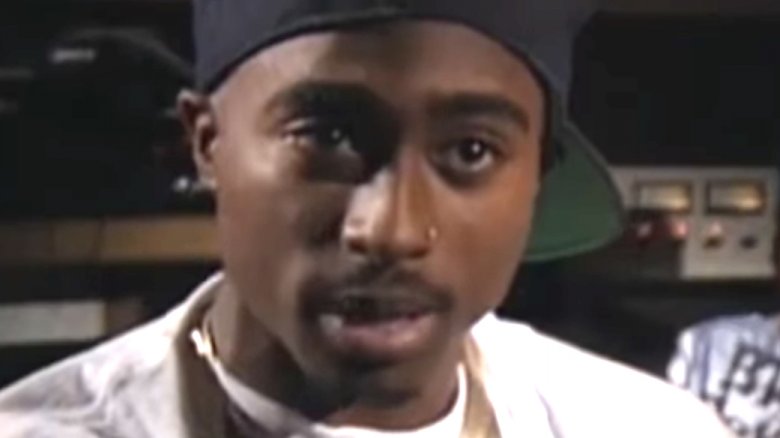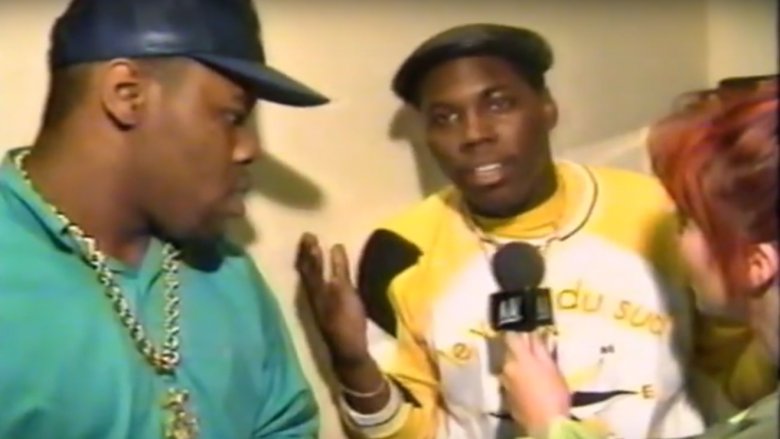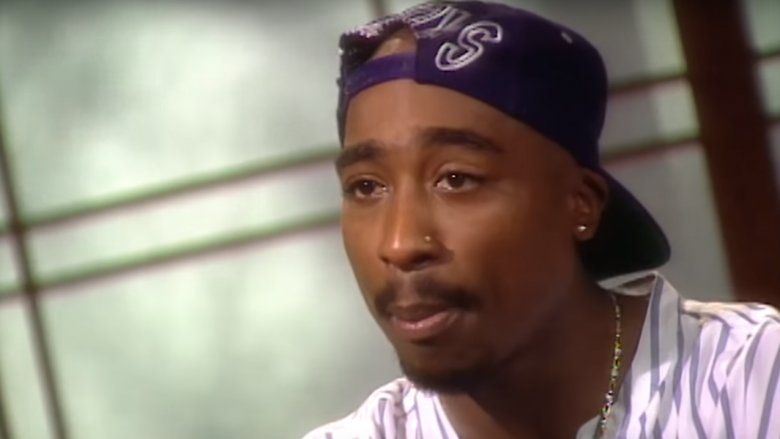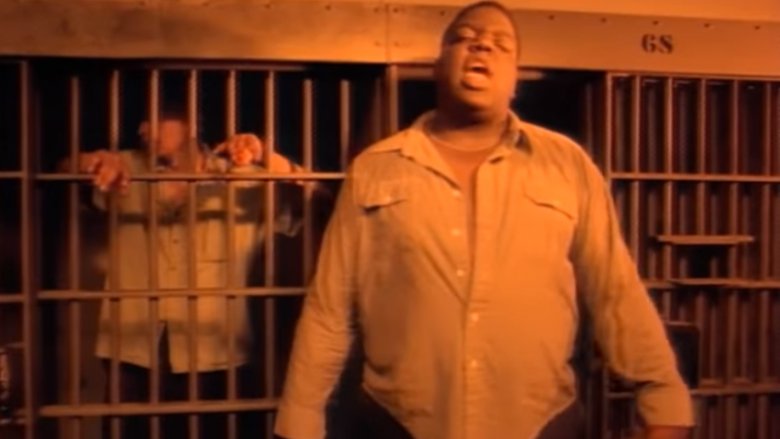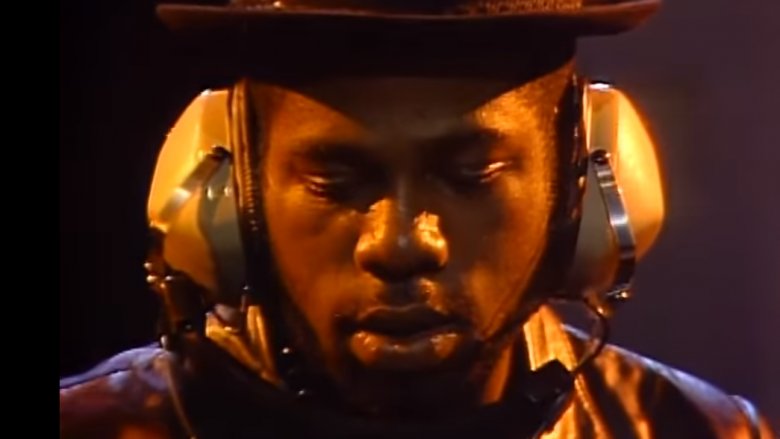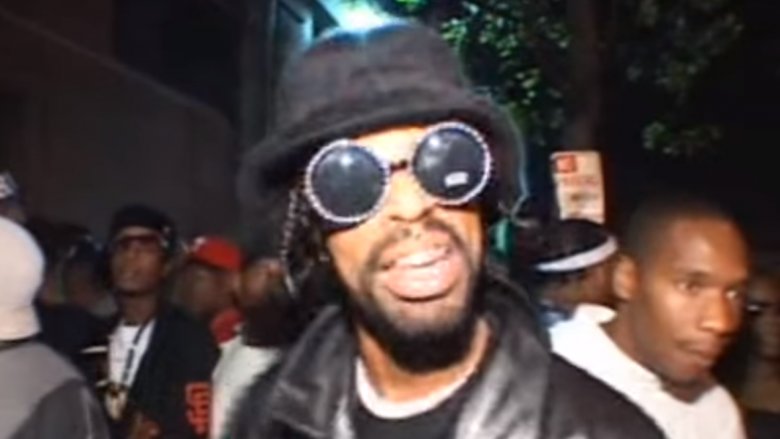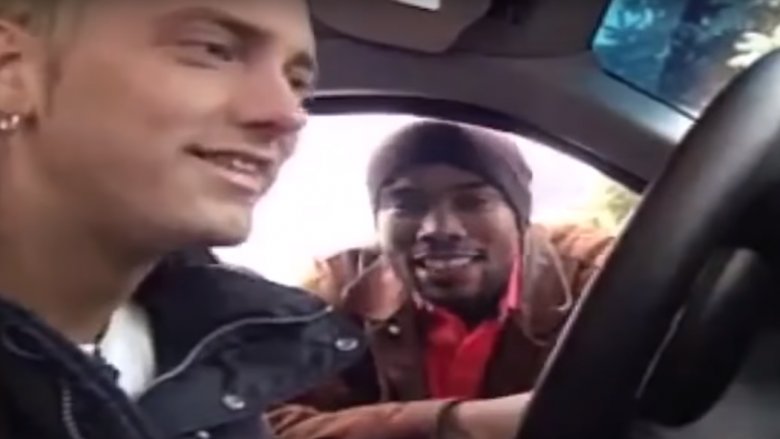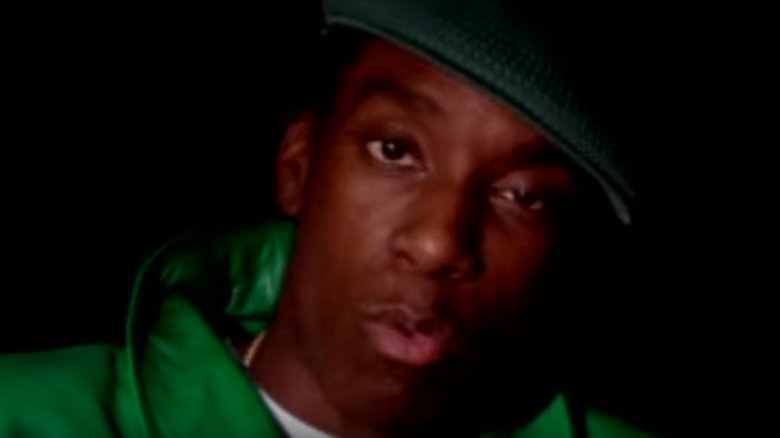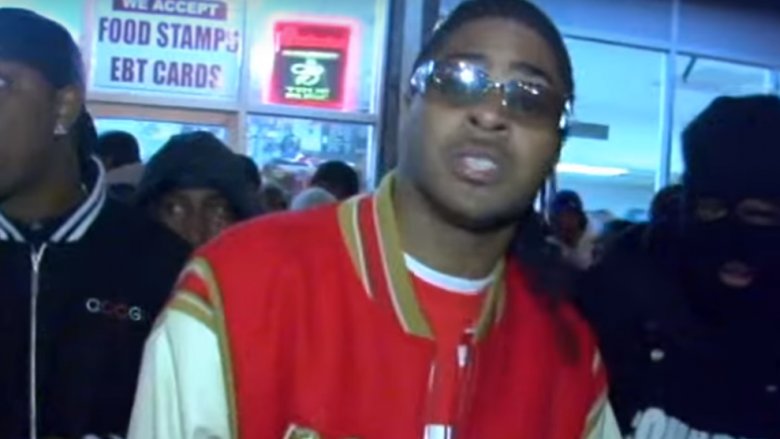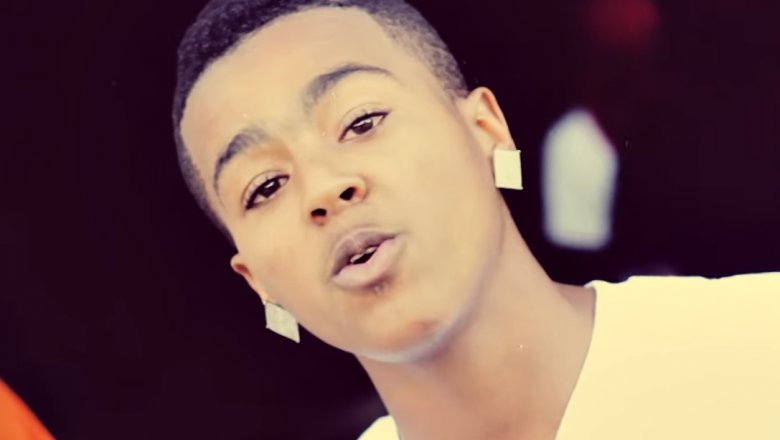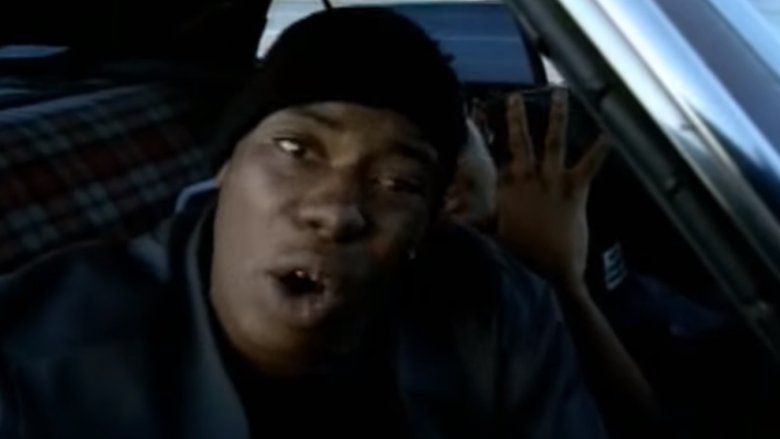Rappers Who Died Under Suspicious Circumstances
There's long been a correlation between rappers and violence. The underlying reasons for this connection aren't as easy to identify as some would like to think, but the truth of the statement cannot be denied. According to a piece in The Conversation, not only do rappers have the shortest life expectancies of performers across all musical genres, but more than half of all rappers' and hip hop artists' deaths are murders. That number is shocking. In fact, it's more than 40 percent higher than the genre with the next highest mortality rate, electronic.
While these numbers alone are hard to believe, in 2015, XXL magazine took a closer look at 63 murdered rappers and found that more than 40 of those cases were still unsolved. One of the reasons why is because many of these rappers died under suspicious circumstances. Whether there were no witnesses or just no witnesses who were willing to talk, no evidence or conflicting evidence, too many rappers have died without anyone being punished.
Let's take a look at some of the highest-profile rapper deaths and the odd details surrounding around their murders.
Scott La Rock and the shooting that changed hip hop
There was more than a decade of relative peace in the hip hop scene from the time it was born until August 27, 1987, the day Scott "La Rock" Sterling died from gunshot injuries. Considered the first murder in hip hop, La Rock's death came just five months after his group, Boogie Down Productions, released its debut album. It changed the way people looked at hip hop. "In some respects, rap music and violence seem to go hand in hand," Scotty Morris, Sterling's manager, said to The New York Times. "But it's not the music itself, it's the environment. Violence was here long before hip-hop."
According to reports, Sterling and his entourage visited Highbridge Garden Homes in the Bronx to diffuse an altercation between some youths. After speaking to a group of boys thought to be involved, Sterling and company got back into their vehicle to leave. As they were pulling away, shots were fired, and bullets struck Sterling in the head and neck. He was then rushed to hospital, but, unfortunately, he died the following morning.
The next year, two teenagers, Cory Bayne and Kendall Newland, were arrested and charged for the murder. But during trial, they were later acquitted.
Tupac Shakur's death still haunts the music industry
Sept. 7, 1996 is a date carved into the foundation of hip hop. On that night, Tupac Shakur, one of the world's most popular rappers, was shot. He died six days later. Two years earlier, he had been shot five times and robbed while at a recording studio. After he recovered from that near-fatal encounter, Shakur publicly called out fellow rappers Sean "Diddy" Combs and Christopher Wallace (Notorious B.I.G.), which led to one of the fiercest feuds in rap history.
This is partly why many fans and conspiracy theorists alike believe that Shakur's rivals were behind his murder. Others point the finger at Shakur's manager at Death Row Records, Suge Knight, who was in the car with the rapper the night he was shot. But there's another possible explanation.
On the night he was fatally wounded, Shakur and his entourage attended a Mike Tyson fight at the MGM Grand in Las Vegas. After the fight, there was an altercation between Shakur and rival gang member Orlando Anderson that appeared to have been captured on CCTV. After the fight, Shakur fled the scene. Shortly afterward, while stopped on the strip, a white Cadillac pulled up beside Shakur's vehicle, spraying bullets and hitting the rapper four times. Despite many signs pointing to Anderson being the culprit, no charges were ever made because no one identified Anderson as the triggerman.
The big question about Notorious B.I.G.'s death
Despite the theories of his involvement in the death of Tupac Shakur, Christopher Wallace, the rapper best known as Notorious B.I.G., was never actually implicated by investigators. Regardless, after Shakur's death, tensions between the East (Wallace) and West (Tupac) were at an all-time high in rap. When Wallace went to Los Angeles to promote his album, he voiced concern for his safety. It seems that he was right to be fearful.
On March 8, 1997, Wallace presented an award at the Soul Train Music Awards and was booed by the west coast audience. Following the show, the rapper and his entourage attended an after-party. Leaving the event afterwards, Wallace and company climbed into a two-vehicle convoy. Later, while stopped on the road, a Chevrolet Impala pulled up beside the vehicles and an unknown assailant shot Wallace four times, killing him.
In an interview with the Daily Mail, Wallace's mother, Voletta Wallace, suggested that the killer's identity is known to them, even though no arrests were ever made. "I have a very good idea who murdered Christopher," she said. "And I genuinely believe that the LAPD know exactly who did too. ... It seems to me that it's one giant conspiracy, and someone is definitely being protected somewhere down the line."
Who shot Jam Master Jay?
Some deaths in rap are more shocking than others, if only because the victims don't match the crime. When DJ Jam Master Jay of Run-DMC fame was shot and killed inside a recording studio in 2002, people were surprised because Jay was a respected member of the community and seen as a positive role model in the rap industry. Yet, he appeared to be have been targeted by someone.
On Oct. 30, 2002, Jay was in a New York studio preparing for a session. According to reports, Lydia High, Jay's receptionist, buzzed two men into the building. When the men entered, they ordered High to get on the ground. Jay then greeted the men, slapping hands with them, seemingly indicating that the DJ knew them. Just then, shots rang out. Uriel Rincon, Jay's friend, was shot in the leg, and Jay was hit with a fatal shot in the back of the head.
Though there were four witnesses in the studio that survived, none were able to identify the shooters. With nothing to go off of, police investigators saw the case go cold. But the streets still talk, and many believe they know who the killer is. "Honestly, I think the police know what happened but they just don't want to see justice done," says Olivia Jackson, a neighborhood resident (via MTV). "I know who killed him because I'm in the streets. If I know, then I'm pretty sure they do too."
Street rumors of Mac Dre's death
Before he died, Andre Hicks (aka Mac Dre) never became a mainstream rapper, but he did leave his mark on the industry. In late 2004, after performing a show in Kansas City, Hicks and the van he was riding in was attacked. The rapper was shot in the neck and killed. When police approached witnesses and friends of Hicks to put together information, no one was willing to cooperate (via SFGate). Some of the rapper's entourage even pretended they didn't know Hicks.
With nothing to go off of, police made no arrests, but they did follow up on some rumors. The most prevalent whisper was that Anthony "Fat Tone" Watkins, a Kansas City rapper, was responsible. "Every shooting that happened (in Kansas City), you would get calls saying, 'Fat Tone did it, Fat Tone did it.' His name always came up," said Detective Everett Babcock. Still, police followed up on the talk. In the end, Watkins was thought to be innocent, but rumors still circulated the streets.
"I told him we expected retribution," Detective Babcock said. "He said, 'I'm watching myself.'" Months later, in May 2005, Watkins was discovered dead in Las Vegas from bullet wounds. The shooter, Andre "Mac Minister" Dow, who was later caught after a 10-month manhunt, admitted that he shot and killed Watkins "to avenge Hicks' killing." So, it'd appear that Watkins died for a shooting in which he was never even named a suspect.
Lack of Proof
After DeShaun Dupree Holton — better known as Proof —was shot and killed at Detroit's CCC club, police investigators determined that the rapper, while in an altercation with Desert Storm veteran Keith Bender Jr, pistol-whipped and then shot Bender, as reported by The Guardian. Allegedly threatening to shoot the man again, Proof was then reportedly shot in the back of the head by Bender's cousin and the club's bouncer, Mario Etheridge. Both Bender and Proof died from their injuries.
Yet several witnesses claimed that, during a fist fight between the two, bullets started flying, but neither Proof nor Etheridge initially had guns. H. Mack, a friend and witness of the events, told The Guardian, "The fight wasn't just the two of them, everyone in the club was involved. Guns started goin' off. P hit the guy, and then his cousin Etheridge fired shots into the ceiling. I do not believe P shot the man."
An anonymous witness recalled that, after the crowd noticed Proof and Bender had been shot and were laying lifeless, everyone scrambled outside. According to the witness, "A few minutes later, [Proof's body] was deposited outside the club's back door, his jewellery and money gone." To complicate matters further, long-time friend of Proof and witness that night Mudd, said, "I found out that Proof and Keith Bender were at Osborne [high school] together. ... It almost seemed like this was some high-school grudge s**t." Whatever the cause, this shooting may not have been as simple as the police reports made it seem.
Looking for evidence in Big L's killing
Even though Big L (real name Lamont Coleman) only left behind one completed album, he's often considered one of the greats in hip hop. Tragically, on Feb. 15, 1999, a 24-year-old Coleman was gunned down in a drive-by shooting not far from where he grew up in Harlem, N.Y. A few months later, police arrested Gerard Woodley for the murder (via New York Daily News).
Woodley, an old friend of Coleman and his brother, Leroy "Big Lee" Phinazee, was believed to have had a grudge against the latter after they'd had a falling out. Woodley reportedly wanted revenge. With Phinazee in jail, however, Woodley is said to have enacted his revenge on Coleman instead. Despite police having a motive for Woodley's crime, they were forced to release him from custody by order of the Manhattan District Attorney after little evidence was found and not enough witnesses came forward to testify against the accused.
Then, in 2016, Woodley was killed in an unrelated incident. Though police believe the two shootings to be unrelated, Woodley's brother, Thomas Riley, "suspects a Big L fan may have killed his brother, saying there's an abundance of chatter online fingering Woodley as the rapper's killer," as reported by the New York Daily News.
Possible jealousy leads to the death of Stack Bundles
Stack Bundles may not be the most mainstream name in rap, but hip hop fans knew him well during his meteoric rise through the ranks. The rapper, whose real name was Rayquan Elliot, had his climb to fame cut short in 2007, however, when he was shot and killed outside his apartment complex in Queens, N.Y. (via The New York Times). After coming home from a night out, Elliot was gunned down before he could reach his apartment.
Though no arrests were made, the rapper's family believes that jealousy within the neighborhood led to his death. The warning signs were there. A month before his murder, Elliot's Porsche was vandalized. Others whispered about groups being envious of Elliot's growing popularity as well. Still, after no new evidence came out, police interest in the case waned.
Then, in 2015, a rapper named Lionel "Chinx" Pickens was shot and killed. Since Pickens was a long-time friend of Elliot's, some, including Elliot's brother Ronald Ulmer, believe the murders were linked. "I really think they could be related," Ulmer told the New York Daily News. "They were tight. They were a crew. And I just think if a person commits a crime as harsh as killing, and they think they got away with it, they will surface and do it again."
A big feud ended with the death of Lil JoJo
Joseph Coleman, a rapper who went by the stage name Lil JoJo, was shot dead in the streets of Chicago in 2012. His death is believed to be the result of a gang rivalry and rap feud, as reported by The Guardian. In the public eye, the feud started when another rapper, Keith Cozart (aka Chief Keef), gained popularity with his track "3Hunna," which referenced his involvement in the Chicago gang Black Disciples (via The Daily Beast). Coleman, an alleged member of a rival gang, Gangster Disciples, decided to leverage that song and the gang rivalry to create a rap beef.
In his version of the song, "3HunnaK," Coleman taunted the Black Disciples, chanting, "BDK," which reportedly means "Black Disciple Killers." On the afternoon of his death, Coleman posted a video of him and some friends allegedly confronting members of the Black Disciples on the streets. He then tweeted out his location and more taunts to the rival gang. Within a few hours, Coleman was dead, shot by someone in a Ford Taurus.
In the aftermath, Cozart, Coleman's rap and gang rival, tweeted, "Jojo Wanted To Be Jus Like Us #LMAO." He later claimed that his account had been hacked.
The sad story of Soulja Slim
When rapper James Tapp, aka Soulja Slim, was shot while on his mother's front lawn in 2003, police believed they knew who did it: Garelle Smith. And they suspected that Smith was paid $10,000 for the murder. Yet pinning the crime on Smith proved to be incredibly difficult, despite Smith being known to police. When they brought him in for the murder, however, no witnesses would come forward. Over the years, Smith was accused of and arrested for three murders in total, but no witnesses came forward for any of them, so Smith was freed each time.
According to Tapp's stepfather in an interview with Billboard, "envy of Soulja Slim's swift rise might have motivated the killing." If Smith was a hitman, as some believed, the question of who ordered the hit on Tapp is one that still has not been answered. Either way, Smith, the accused shooter, would eventually become a victim. In 2011, eight years after the shooting of Soulja Slim, Smith himself was gunned down. No arrests were made in that case either.

